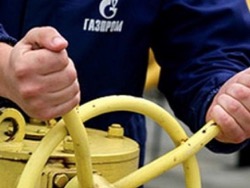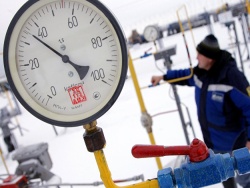
The Europeans continue to demand from Gazprom’s new gas discounts. Before them it was still possible to understand the price of oil reached $ 100 per barrel, namely attached to them, the cost of gas. Now, however, market conditions could not be better favors the buyers of gas. Why Europeans are still unhappy and whether they can achieve the desired?
Five European partners of “Gazprom” in the court order required the company to renegotiate the price of gas supplies, the report said Corporation for the first quarter of 2016.
We are talking about DONG Naturgas Danish, Polish PGNiG, Turkish Botas Petroleum Pipeline Corporation, Dutch GasTerra and the London-based Shell Energy Europe. Claims are filed at different times, latest action “Gazprom” has received in early may from a Dutch company (international court of arbitration of the International chamber of Commerce).
Gazprom is constantly faced with claims about the prices of the European companies. With almost all the current plaintiffs suing it is also not the first time. For example, Shell Energy Europe for the third time delivers on “Gazprom” the claim of price revision of the contract. The last claim was submitted to arbitration in November 2015. Prior to this, the price for the company was revised in 2011 and 2014. Earlier “Gazprom” has legal proceedings with the Dutch, Danish, Polish, and Turkish companies.
Gazprom often not bring the matter before the court decision, the parties shall resolve the dispute peacefully. For example, in 2012, Gazprom has reduced the contract price under long term contracts of gas for European consumers by 10% on average. He made concessions to a number of important clients of the holding – including French GDF Suez, German Wingas, Slovak SPP and Turkish Botas.
The number of contracts with the Europeans prescribed paragraph about the opportunity every three years to adjust the formula price for the agreement by both parties. And European buyers always try to use this provision, as any buyer. This is the right that, for example, used the Dutch GasTerra. Last fall the Dutch were negotiating with Gazprom on this subject, but given the lawsuit now, we can say that to come to a common agreement of the parties and failed.
Gazprom did not disclose the pricing formula, but we know that it is tied to the cost of oil. Therefore, in the period of high oil prices, European buyers often tried to change the formula. The Europeans have demanded to introduce in the formula the spot component, to make the cost of gas cheaper. The treaties themselves are classified, but there is an understanding that in recent years Gazprom has included a number of contracts, the spot component with preservation of oil binding or otherwise prescribed discount.
Now, however, the market situation, on the contrary, is the best favors European buyers of gas. It followed oil falls and the price of gas due to the contract with “Gazprom” the oil binding. So, in 2015 the average price of exports of “Gazprom” in Europe amounted to 243 USD per thousand cubic meters (with an average oil price of 52.3 per dollar), this year Gazprom expects to sell gas at $ 199 per thousand cubic meters at an oil price of $ 50. A stress scenario for this year meant at all gas exports for 169 dollars per thousand cubic meters at an average oil price of 35 dollars per barrel. Now the Europeans are buying Russian gas in 1,5–2 times cheaper than in the period when oil was above 100 dollars per barrel.
Moreover, the calculation shows that the Europeans get Russian gas is clearly at a discount to oil quotations. “In 2015, the average cost of natural gas, which “Gazprom” sold in Europe, made up 243,45 dollars per thousand cubic meters. If you count the price on energy equivalent in a barrel of oil, it turns out 38.2 per dollar. The average price of a barrel of Brent in 2015 was 36% higher and amounted to $ 52. As we can see, the discount on gas, in comparison with the cost of liquid hydrocarbons is,” – says the analyst of IFC Markets Dmitry Lukashov.
It would seem that the Europeans have no reason to complain. Moreover, now it is just unprofitable to change the price formula and to abandon the oil reference. However, the traditional practice of claims to “to Gazprom” continues. Why?
First, arbitration proceedings may relate to previous periods, when the price of oil was higher and binding to oil and gas prices did not suit buyers, said Deputy Director General of national energy security Fund Alexei Grivach.
Secondly, the situation in the European gas market in recent years is escalating, allowing buyers to try to exert pressure on Gazprom, threatening to reduce purchases in favor of Norway or LNG, which supplies Qatar and just recently began to supply the United States, notes Anton Krasko from MFX Broker.
Another thing is that in reality the share of Gazprom on the European market is still growing. Besides, the Russian pipeline gas in any case much cheaper of more expensive LNG. And the fact that the United States has put yet one party of its LNG at a comparable price, does not mean that the Americans will always sell it to Europe for this price. It is pure dumping in order to take away market share from traditional suppliers – Norway and Russia.
Another argument that Europeans put “to Gazprom” for changes in gas prices, is that they believe natural gas is much less valuable resource than oil. That’s why I want to in the formula of “Gazprom” discount has been increased even more. The fact that the oil makes gasoline for cars, fuel for all modes of transport – planes, ships, etc., and replace it with nothing. But out of gas, make electricity. “Making gasoline from gas is theoretically possible, but very profitable – easier to travel immediately to Gaza. But then it should be higher and dependence on Russia will not decrease, but increase, what the Europeans, of course, do not want”, – said Lukashov. Electric power generation in Europe is missing, including through the development of renewable sources and coal.
“The EU has spent huge funds for the development of renewable energy and now consume about 45% of all energy produced in the world. Another quarter is produced in the U.S. and Canada. For example, in Germany the share of renewable sources is about 10%. Accordingly, now the EU are trying to bring down the price of Russian gas, making this argument”, – says Dmitry Lukashov.
However, long-term analysis of global experts shows that in the next 25 years to replace oil and gas will be nothing. And if now the oil in the global energy sector occupies the first place, and gas is third (after coal), then by 2040, experts expect that gas will increase its share and will fall into second place in the world.
“If they want to completely remove the oil binding, then it is necessary to create a mechanism that will protect the supplier from any manipulation in the spot market”
In any case, the gas can not cost a penny. Its price, of course, falls in proportion to the fall in world oil prices. “But even in the US, despite the “shale revolution” did not happen “zeroing” of quotations of gas. Their correlation with the WTI price, though reduced, but well within the historical range of fluctuations”, – said Lukashov.
However, another possible reason why the Europeans can demand changes to the formula, gas prices right now: they believe that oil prices will change the trend and will again be expensive. The more that the courts take a long time, and some decisions will be made in a year or two, that is only in 2017-2018. For example, the arguments of Shell Energy Europe, the court will hear in February 2018, and the decision on the dispute with the Polish PGNiG should be made up to 31 July 2017.
Dutch GasTerra, however, accelerates the process and needs to start a lawsuit before. Hearings on the suit of DONG Naturgas must pass in October – November this year.
Each of the buyer, of course, has its own history of claims and their arguments, which sometimes have to just guess. For example, Dutch GasTerra, perhaps thinking that oil prices could rise, or wants to clean up the oil in a binding price formula for oil, makes the assumption Grivach.
“But if they want to completely remove the oil binding, then it is necessary to create a mechanism that will protect the supplier from any manipulation in the spot market. GasTerra is the major supplier in the gas hub in the Netherlands, which she probably will want to do a price indicator. The question arises – is there such a hub and the price of it a real reflection of the market situation, and not some object of speculation on the part of a major player?” – explains Grivach.
In other words, if the cost of Russian gas is completely tied to the price in the spot market of the Netherlands, then Amsterdam can get a full control over the cost of natural gas. This will create similar risks, which now has Russia and all other exporters in the market of black gold. The price of oil like as are determined by market supply and demand. But sometimes sharp jumps in oil prices are due to speculation in the stock market, driven by the USA.
The situation with the Turkish Botas – special. The Turks are the speech on the spot component. The nature of their claims that Gazprom itself first provided the company a discount on gas, but then withdrew it. The argument of Russia that was not implemented the package, which was supposed to generate this discount.
“It’s not so much the “Turkish stream”. There was a range of issues associated with the renewal of the contractual obligations, and modes of selection and a lot of other things that were linked to providing discounts. But the package has not been finalized, so the discount was not provided. In the end, Botas is trying to obtain it through arbitration,” – says Grivach.
Poles have a third story. They filed a lawsuit in the spring of 2015, after the failure of negotiations. Either PGNIG agreed to a discount of 5-15%, which usually gave Gazprom in recent years, wanted more. Or “Gazprom” was not agree with the arguments PGNIG on the need to provide her with a new discount.
Most likely, the Polish company threatens to “Gazprom” in that it will stop buying Russian gas in the context of new suppliers. “Perhaps the poles attribute the change in the price of Russian gas with their attempts to organize the supply of gas from the third source. But the fact that the poles are buying LNG for purely oil bound Qatar. More precisely, they pay for the Qatari gas, but do not receive, because the Polish LNG-terminal is still not running. To ask in this kind of discount – questionable reasons”, – said Grivach. In addition, Qatari LNG is more expensive than Russian pipeline.
“Arbitration is a last resort, and typically, units such proceedings reach a decision. Moreover, when such a decision occurs, very often the plaintiff gets less than he was offered during the negotiations. So it was with RWE at the time. So I would not dramatize this story”, – says Alexei Grivach.
That is, the sides can still reach an agreement. “But the fact that these proceedings much evidence that the system of relationships between suppliers and importers undermined. It’s a bad situation that, unfortunately, was created by European regulators. All this creates a normal long-term risks of gas supply in Europe” – sums up the expert gas.






